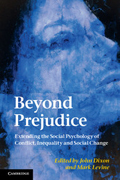
Beyond prejudice: extending the social psychology of conflict, inequality and social change
Dixon, John
Levine, Mark
This edited collection of essays re-evaluates the concept of prejudice and attempts to move beyond conventional approaches to the subject. This edited collection of essays re-evaluates the concept of prejudice, in an attempt to move beyond conventional approaches to the subject. It is an investigation into theproblems of conflict and discrimination, and aims to help the reader gain a clearer understanding of relations within and between groups. This edited collection of essays re-evaluates the concept of prejudice, in an attempt to move beyond conventional approaches to the subject. It is an investigation into the problems of conflict and discrimination, and aims to help the reader gain a clearer understanding of relations within and between groups. The concept of prejudice has profoundly influenced how we have investigated, explained and triedto change intergroup relations of discrimination and inequality. But what hasthis concept contributed to our knowledge of relations between groups and what has it obscured or misrepresented? How has it expanded or narrowed the horizons of psychological inquiry? How effective or ineffective has it been in guiding our attempts to transform social relations and institutions? In this book,a team of internationally renowned psychologists re-evaluate the concept of prejudice, in an attempt to move beyond conventional approaches to the subject and to help the reader gain a clearer understanding of relations within and between groups. This fresh look at prejudice will appeal to scholars and students of social psychology, sociology, political science and peace studies. Advance praise: 'In Beyond Prejudice, an eclectic, internationally renowned group ofsocial psychologists interrogate such staples of their discipline as emotional antipathy, implicit bias, stereotype construction and processes of communication and ideology in promoting racism, sexism and dehumanizing treatment in general. All of the authors are asking how we can change hearts, minds and - most important of all - social systems that foster inequality, indifference and hypocrisy. These are vital questions, and the contributors offer thoughtful, valuable answers.' John T. Jost, New York University, and co-editor of Social and Psychological Bases of Ideology and System Justification INDICE: Introduction John Dixon and Mark Levine; Part I. Beyond Prejudice:1. From perception to mobilization: the shifting paradigm of prejudice Stephen Reicher; 2. Prejudice, social identity and social change: resolving the Allportian problematic Katherine J. Reynolds, S. Alexander Haslam and John C. Turner; 3. An ambivalent alliance: hostile and benevolent sexism as complementary justifications for gender inequality Peter Glick and Susan T. Fiske; 4. Prejudice and dehumanization Nick Haslam and Stephen Loughnan; 5. Stereotyping, prejudice and discrimination revisited: from William James to W. E. B. Du Bois Stanley O. Gaines, Jr; 6. Beyond 'old' and 'new': for a social psychology of racism Samuel Pehrson and Colin Wayne Leach; 7. The notion of 'prejudice': some rhetorical and ideological aspects Michael Billig; 8. The prejudice problematic Margaret Wetherell; 9. Implicit prejudice in mind and interaction Kevin Durrheim; 10. Rethinking the prejudice problematic: a collaborative cognition approach Susan Condor and Lia Figgou; Part II. Prejudice and Social Change Revisited: 11. Models of social change in social psychology: collective action or prejudice reduction? Conflict or harmony? Stephen C. Wright and Gamze Baray; 12. From attitudes to (in)action: the darker side of 'we' John F. Dovidio, Tamar Saguy, Samuel L. Gaertner and Erin L. Thomas; 13. Contact and social change in anongoing asymmetrical conflict: four social-psychological models of reconciliation-aimed planned encounters between Israeli Jews and Palestinians Ifat Maoz;14. From prejudice to collective action Clifford Stott, John Drury and Stephen Reicher; Conclusions and future directions: the nature, significance and inherent limitations of the concept of prejudice in social psychology John Dixon and Mark Levine.
- ISBN: 978-0-521-13962-5
- Editorial: Cambridge University
- Encuadernacion: Rústica
- Páginas: 346
- Fecha Publicación: 12/01/2012
- Nº Volúmenes: 1
- Idioma: Inglés
